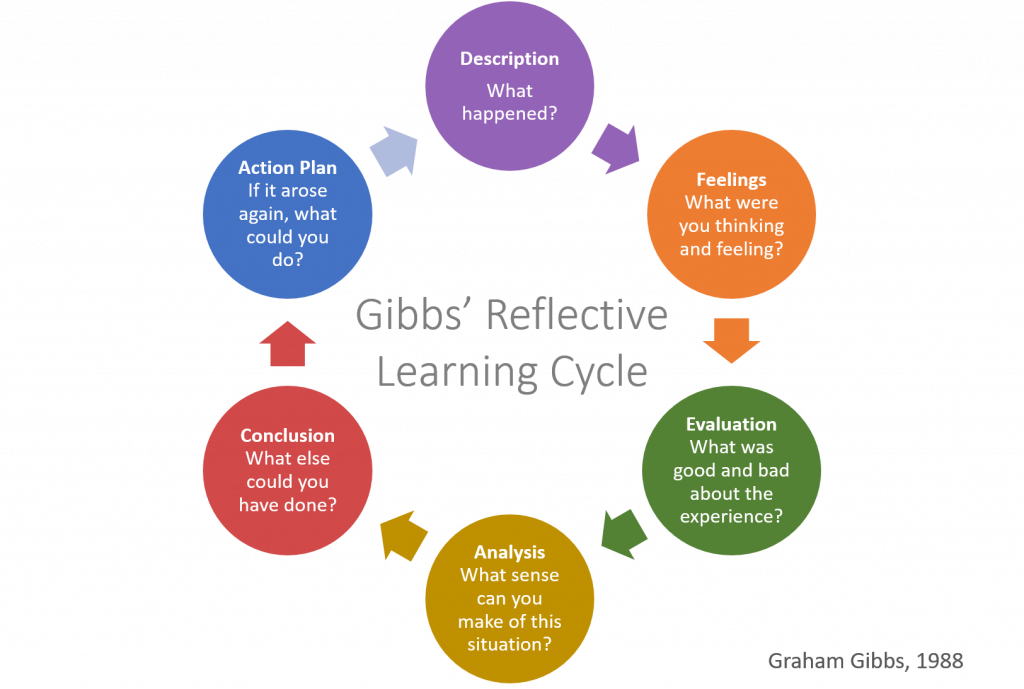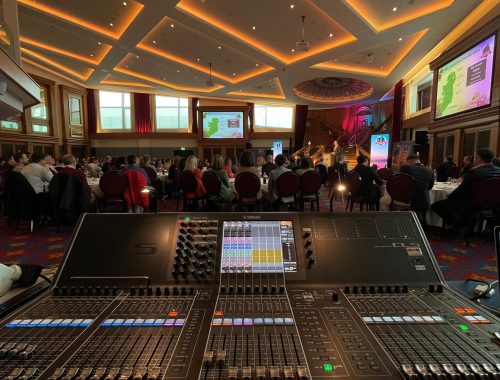BIG PROBLEMS AT BIG TELLY
A tad hyperbolic but an eye-catching headline. My experience working on Big Telly’s interactive theatre experience Incognito was a great one and that requires zero hyperbole. I was able to have hands-on experience working behind the scenes and on the set of my first true extra-curricular theatre production which was a massive plus, however, the intricacies of working within such a new medium (technologically-aided interactive theatre) was the source of some trouble and stress in an otherwise fantastic placement opportunity. In reflecting on my time with Big Telly, I will continue to implement the model which has served me well so far, Gibb’s Reflective Learning Cycle.

Getting off the train in Portrush, feeling the brisk sea breeze shudder my bones, it felt as if my body was preparing itself for the stresses of the days ahead. Walking down the street and into the Portrush Atlantic Hotel, I was greeted by Linda, the production manager of Big Telly whom I was corresponding with via email before meeting the team in person. The team dubbed itself as the “Incognito Spy Network”, in keeping with the theme of the production as a top secret spy mission. Day One felt like being thrown into the deep end but with a pool noodle in the sense that I was working incredibly hard on the logistics side of planning live theatre (accounting for weather and foot traffic) whilst also simultaneously being welcomed warmly with warm-up games and an established introduction to each cast and crew member. What was good about this was that it thrust me into an active theatre production that was unchanged in terms of professionalism with the introduction of me, however what was bad about this was that I struggled to walk the line between being eased into the production and being thrust straight into the hard work. I can make sense of this situation as I had joined the production late and they had an obligation to produce a cohesive play regardless of my inclusion. I could have combated this limiting feeling of needing to be welcomed by reaching out prior to communicate with the team virtually, so as to come into the workspace with an established rapport with my colleagues. If this issue arose again, I would make sure to address it directly within a cheery space between work such as a lunch break.

Quite possibly the biggest source of stress for me during this production occurred on the first day of the performance as I had developed a fever overnight and I had to miss out on performing the role of Max, assistant to Celine Foxwood and accomplice to the evil Trevelyan Von Tigo. Distressed, I rang Sinead who was in charge of technical aspects of the performance and she informed me that they had a fail-safe in which they had an understudy to learn my lines and stand in for me. Initially, I felt awful for letting the team down and this feeling changed into a similarly negative one of sadness as I had found out they had replaced me so quickly. An article on Spotlight’s website provided comfort for me as I had never been recast before; comfort came specifically from the line “To accept that we cannot predict or control outcomes or indeed others (or read their minds!) is a huge psychological relief.”2 What was bad about this experience was that I put the team in an uncomfortable position (even if inadvertently) and this meant that both myself and Big Telly were under a lot of unneeded duress. What was good about this situation though was that they worked around my day-long sickness and still made me feel like a valued member of the team. They did this by casting me as a secret agent tasked with communicating back to headquarters if teams had veered off course (which they often did). An article by theatrefolk.com helped me to feel reassured about my ability to work in a team, specifically when the article said “.Within a collaboration the group not only has to work together, they have to think together. The end product comes from the efforts of the group.”3 and this saying rang true for me on the last two days of my placement as I took my new role with pride. I understand how this situation evolved as they had to have a backup in the event of the worst case scenario coming to fruition and it was unfortunate that I was the cause of said scenario. If I were to do something different I would perhaps have asked to know their fail-safes for if an actor ends up sick beforehand, primarily to minimise the initial stress I felt when telling the crew I was too unwell to be present. If this were to happen again I would make an effort to talk with my understudy beforehand so the vision I had for the character I was developing still saw the light of day regardless of who was portraying him.

To conclude, while the whole experience was less than perfect, we managed to create a play in spite of the difficulties within the production and even on performance day. Overcoming illness, a hectic working schedule and the ever-erratic actions of a public heavily involved in the production proved incredibly difficult but we managed to come out on top and I am incredibly grateful for the opportunity to prove my mettle amongst seasoned theatre professionals.
BIBLIOGRAPHY:
1 Graham Gibbs, ed.ac.uk/reflection/reflectors-toolkit/reflecting-on-experience/gibbs-reflective-cycle
2 Penelope Granycome, Overcoming Self-Judgment as an Actor, https://www.spotlight.com/news-and-advice/overcoming-self-judgment-as-an-actor/
3 Lindsay Price, Collaboration vs. Teamwork – What’s the difference?, https://www.theatrefolk.com/blog/collaboration-vs-teamwork-whats-the-difference/#:~:text=In%20a%20dramatic%20context%2C%20putting,the%20efforts%20of%20the%20group.



